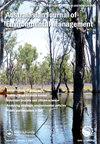A multilevel analysis of climate change inaction: case study of an Australian electricity company
IF 1.5
4区 社会学
Q4 ENVIRONMENTAL STUDIES
Australasian Journal of Environmental Management
Pub Date : 2020-04-02
DOI:10.1080/14486563.2020.1758806
引用次数: 3
Abstract
ABSTRACT Climate change is a key societal and economic challenge. Despite widespread recognition for the need for urgent action on climate change, transformation to a zero carbon economy is still elusive. While there are detailed accounts of organisational responses to climate change impacts, little is known about climate change inaction. We adopt the theoretical framework of resilience in social-ecological systems to explore the change processes needed to overcome climate change inaction. Through an in-depth case study of an Australian energy company, we identify the impediments to climate change action due to rigidity and scarcity traps at three levels: micro (organisation), meso (industry), and macro (government). These traps inhibit transformation from a fossil fuel regime to a renewable energy regime. Our study contributes to a multi-level theory of organisational inaction on climate change by identifying specific causal factors that erode systemic adaptive capacity, increasing the probability of rigidity and scarcity traps. We find that different inaction occurs at all three levels, and is closely interconnected (across levels) within a social-ecological system, due to dynamic antecedents (e.g. changing individual attitudes, business practices, and government policies). Competencies, resources, and cultural changes can help organisations traverse rigidity and scarcity traps to overcome climate change inaction.气候变化不作为的多层次分析——以澳大利亚一家电力公司为例
气候变化是一个重大的社会和经济挑战。尽管人们普遍认识到需要采取紧急行动应对气候变化,但向零碳经济的转型仍然遥不可及。虽然有组织应对气候变化影响的详细描述,但对气候变化不作为知之甚少。我们采用社会生态系统弹性的理论框架来探索克服气候变化不作为所需的变化过程。通过对一家澳大利亚能源公司的深入案例研究,我们从微观(组织)、中尺度(行业)和宏观(政府)三个层面确定了僵化和稀缺性陷阱对气候变化行动的阻碍。这些陷阱阻碍了从化石燃料体制向可再生能源体制的转变。我们的研究通过确定侵蚀系统适应能力、增加刚性和稀缺性陷阱可能性的特定因果因素,为组织对气候变化不作为的多层次理论做出了贡献。我们发现,由于动态的前因(如个人态度、商业行为和政府政策的变化),不同的不作为发生在所有三个层面,并且在社会生态系统中紧密相连(跨层面)。能力、资源和文化变革可以帮助组织跨越僵化和稀缺陷阱,克服对气候变化的不作为。
本文章由计算机程序翻译,如有差异,请以英文原文为准。
求助全文
约1分钟内获得全文
求助全文
来源期刊

Australasian Journal of Environmental Management
ENVIRONMENTAL STUDIES-
CiteScore
2.60
自引率
0.00%
发文量
16
 求助内容:
求助内容: 应助结果提醒方式:
应助结果提醒方式:


